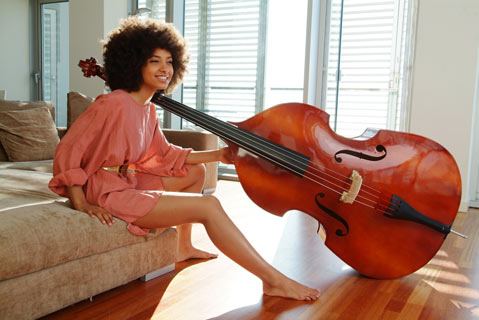Esperanza Spalding Comes to Campbell Hall
Best New Artist Grammy Winner Makes Santa Barbara Debut at UCSB

She became the big surprise story of the 2011 Grammy Awards by upsetting the heavily favored teen pop sensation Justin Bieber in the coveted Best New Artist category, but for followers of jazz, Esperanza Spalding was already a superstar. Her three albums—Junjo (2006), Esperanza (2008), and Chamber Music Society (2010)—exude the unshakeable confidence of a visionary artist who is on a mission to put jazz back at the center of American popular culture. Born and raised in the eclectic music scene of Portland, Oregon, Spalding discovered her instrument, the bass, when she was in high school. A stint at the Berklee College of Music allowed her to connect with some important mentors, including Patti Austin, Joe Lovano, and Pat Metheny. And what they saw in Spalding is just what Grammy voters must have recognized—prodigious talent as an instrumentalist, a distinctive and powerful singing voice, and that “X” factor that marks those destined for greatness. Post-Grammy, Spalding has already sold out her concert at the Portland Jazz Festival. She comes to UCSB’s Campbell Hall on Sunday, February 27, for a gig presented by the prescient folks at Arts & Lectures, our resident experts on the next big thing. I corresponded by email with Spalding just days after her Grammy win.
With the Best New Artist category open to so many different kinds of music, do you feel that jazz was also honored by your Grammy win? Totally. Just being nominated was special. It has been a long time, more than 30 years, since jazz music was nominated in the Best New Artist category. I do hope that this is an opportunity for more people to listen to music that maybe before they thought that they wouldn’t like. If this can show that jazz is very diverse and very much a living, eclectic style, then that is great.
You’ve experienced a lot of recognition and played in a number of high-profile situations, but being asked by President Barack Obama to play for the Nobel Prize ceremony still must stand out as something special. Did you enjoy the Nobel ceremony, and did you connect with the President over it? It was an honor to have been invited to Oslo and to perform at such a prestigious event. We didn’t stop all day, as after the prize ceremony, there was a concert that evening, so there wasn’t much time.
On your self-titled album, you step out into some other genres while still retaining your jazz roots. How important is the jazz bass tradition to what you do? You say it there; it is the roots, your base, and improvised music has such scope—that is part of its beauty. On top you can add in the other styles, [but what’s] holding it all together are those bass lines.
Following up on the last question, what genres of non-jazz music are left for you to explore? What do you plan to take on next? There’s lots left to explore. After this tour is finished, I’m going back in the studio to finish my latest album, Radio Music Society. This is a continuation of Chamber Music Society. When I was growing up, I listened a lot to the radio, to soul, pop, hip-hop, funk, R&B, and this new album has those elements included.
4•1•1
Esperanza Spalding and the Chamber Music Society play UCSB’s Campbell Hall on Sunday, February 27, at 7 p m. Tickets and information are available at 893-3535 or artsandlectures.sa.ucsb.edu.



